The hidden [sins] are for Hashem, our God, but the revealed [sins] are for us and our children forever, to carry out all the words of this Torah.
–Deuteronomy 29:28 (Stone Edition Chumash)
Then Hashem, your God, will bring back your captivity and have mercy on you, and He will gather you in and from all the peoples to which Hashem, your God, has scattered you. If your dispersed will be at the ends of heaven, from there Hashem, your God, will gather you in from there He will take you. Hashem, your God, will bring you to the Land that your forefathers possessed and you shall possess it; He will do good to you and make you more numerous than your forefathers. Hashem your God, will circumcise your heart and the heart of your offspring, to love Hashem, your God, with all your heart and with all your soul, that you may live.
–Deuteronomy 30:3-6 (Stone Edition Chumash)
As I was reading and studying last week’s Torah portions (Nitzavim-Vayelech), I was reminded of recent events and felt challenged to reaffirm or refute my belief in the continuation of the Torah mitzvot as obligatory for Jewish people, both as the conditions of the current Sinai Covenant, as well as the emerging New Covenant.
The above-quoted verses are very revealing. Moses is speaking to assembled Israel for the last time. He will die very soon now, and Joshua will succeed him as leader and prophet for the people and take them across the Jordan to possess the Land of Promise. In many ways, he knows that one of the few things standing between his precious people and their downfall into idolatry and abandoning God, is devotion to the Torah as a way of life.
But as the first words I quoted from Deuteronomy 29 testify, God’s intent for the “words of…Torah” in Israelite lives is that it be carried out “forever.” Then later, in the following chapter, Moses says something I consider astonishing, because I tend to never think of him as a prophet who foretold of the New Covenant:
“Behold, days are coming,” declares the Lord, “when I will make a new covenant with the house of Israel and with the house of Judah, not like the covenant which I made with their fathers in the day I took them by the hand to bring them out of the land of Egypt, My covenant which they broke, although I was a husband to them,” declares the Lord. “But this is the covenant which I will make with the house of Israel after those days,” declares the Lord, “I will put My law within them and on their heart I will write it; and I will be their God, and they shall be My people. They will not teach again, each man his neighbor and each man his brother, saying, ‘Know the Lord,’ for they will all know Me, from the least of them to the greatest of them,” declares the Lord, “for I will forgive their iniquity, and their sin I will remember no more.”
–Jeremiah 31:31-34 (NASB)
For I will take you from the nations, gather you from all the lands and bring you into your own land. Then I will sprinkle clean water on you, and you will be clean; I will cleanse you from all your filthiness and from all your idols. Moreover, I will give you a new heart and put a new spirit within you; and I will remove the heart of stone from your flesh and give you a heart of flesh. I will put My Spirit within you and cause you to walk in My statutes, and you will be careful to observe My ordinances. You will live in the land that I gave to your forefathers; so you will be My people, and I will be your God. Moreover, I will save you from all your uncleanness; and I will call for the grain and multiply it, and I will not bring a famine on you. I will multiply the fruit of the tree and the produce of the field, so that you will not receive again the disgrace of famine among the nations. Then you will remember your evil ways and your deeds that were not good, and you will loathe yourselves in your own sight for your iniquities and your abominations. I am not doing this for your sake,” declares the Lord God, “let it be known to you. Be ashamed and confounded for your ways, O house of Israel!”
–Ezekiel 36:24-32 (NASB)
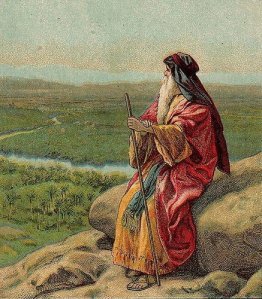 Moses was a prophet foretelling what Jeremiah and Ezekiel also related, God’s ultimate plan of redemption for Israel, a plan which always included, not the “fulfillment” of the Torah through Jesus as in “the end,” but the continuation of Torah observance, only by having it written on the heart and through the Spirit, so that obedience to God would become natural and woven into the very fabric of human nature.
Moses was a prophet foretelling what Jeremiah and Ezekiel also related, God’s ultimate plan of redemption for Israel, a plan which always included, not the “fulfillment” of the Torah through Jesus as in “the end,” but the continuation of Torah observance, only by having it written on the heart and through the Spirit, so that obedience to God would become natural and woven into the very fabric of human nature.
Messiah Yeshua (Christ Jesus) as the mediator of the New Covenant also affirmed this:
“Teacher, which is the great commandment in the Law?” And He said to him, “‘You shall love the Lord your God with all your heart, and with all your soul, and with all your mind.’ This is the great and foremost commandment. The second is like it, ‘You shall love your neighbor as yourself.’ On these two commandments depend the whole Law and the Prophets.”
–Matthew 22:36-40 (NASB)
Rather than replacing the many Torah mitzvot, Messiah as teacher and prophet, said that the heart and soul of Jewish observance and obedience to God was at the intent of the person, not out of rote habit or behavior. All of the commandments are dependent on loving God and loving your fellow human being. Without love of either, the actions themselves are nothing, but the Master did not nullify these commandments, rather, he confirmed that only by loving God and people did they have any meaning. That love for God and people are the two “containers” that hold the dear mitzvot of Moses in the Jewish mind, heart, and spirit, rather than just characters and words on a scroll.
Not with you alone do I seal this covenant and this imprecation, but with whoever is here, standing with us today before Hashem, our God, and with whoever is not here with us today.
–Deuteronomy 29:13-14 (Stone Edition Chumash)
The commentary on verse 14 in my Chumash is most revealing:
The covenant was binding even on unborn generations who were not present to enter into it, because parents and children are like trees and their branches. Just as the potential of all branches is contained in the parent tree, so future generations are contained, as it were, in the parents who will give birth to them, and are bound by the parental covenant. Alternately, all Jewish souls were present at this covenant, just as they were at Sinai when the Torah was given. Only the bodies were not yet born (R’ Bachya). According to Gur Aryeh, future generations were bound because of the principle that an inferior court cannot overrule a court greater than itself (Megillah 2a). So, too, the court of Moses and the nation entered into a covenant that no later generation can annul.
-Stone Edition Chumash commentary on Deuteronomy 29:14, p.1087
Although many Christians and not a few Hebrew Roots Gentiles take a dim view of Rabbinic commentary (or sometimes any human commentary), we see Jewish understanding reads this verse as intending the Sinai Covenant and its conditions, the Torah mitzvot, be binding not only on the generation that stood at Sinai, and not only on the generation that stood at the eastern bank of the Jordan hearing Moshe’s words, but on all subsequent generations of Israelites and their descendants, the Jewish people, in perpetuity.
To the degree that we see Yeshua affirming the Torah and we see the Apostle to the Gentiles Paul upholding and affirming the Torah, the Temple, and the Traditions (at his many trials in the latter portions of the Book of Acts including Acts 28:17), there is nothing from the transmitters of the New Covenant that contradicts the promises of God through Moses and the Prophets.
Hashem will make you abundant in all your handiwork — in the fruit of your womb, the fruit of your animals, and the fruit of your Land — for good, when Hashem will return to rejoice over you for good, as He rejoiced over your forefathers, when you listen to the voice of Hashem, your God, to observe His commandments and His decrees, that are written in this Book of the Torah, when you shall return to Hashem, your God, with all your heart and all your soul.
–Deuteronomy 30:9-10 (Stone Edition Chumash)
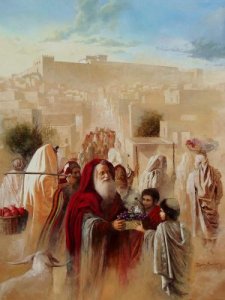 This sounds a great deal like what we read in the quote from Ezekiel 36:24-32 above. Different prophets but the same God and His unchanging intent and plan for Israel.
This sounds a great deal like what we read in the quote from Ezekiel 36:24-32 above. Different prophets but the same God and His unchanging intent and plan for Israel.
The Torah is in the New Covenant future for all generations of Jews. It could be said that the Jewish people are the only ones born into covenant with God whether they want to be or not. The exception is that all of mankind is also in covenant based on God’s promises to Noah in Genesis 9, but the covenant God made with Israel is unique, multilayered, and multidimensional. It is also everlasting.
But before faith came, we were kept in custody under the law, being shut up to the faith which was later to be revealed. Therefore the Law has become our tutor to lead us to Christ, so that we may be justified by faith. But now that faith has come, we are no longer under a tutor. For you are all sons of God through faith in Christ Jesus.
–Galatians 3:23-26 (NASB)
For Christ is the end of the law for righteousness to everyone who believes.
–Romans 10:4 (NASB)
I previously addressed what it is to be the “end of the law for righteousness” relative to the meaning of the Greek word “Telos” in my recent reflection on Romans 10, so I won’t go over old material again. I understand that this verse along with what Paul wrote in the above-referenced section of his epistle to the Galatians (see the link at the bottom of this blog post for more about how we misread Galatians) makes it seem as if the Torah was only applicable and efficacious until the life, death, resurrection, and ascension of Jesus, but if that is true, then Paul is in direct contradiction with Moses and the Prophets, and I find that difficult (actually impossible) to believe.
If the Torah was intended to be observed “forever” by the Jews both under the Sinai and New Covenants, how could Jesus be its termination (and replacement)?
For this commandment that I command you today — it is not hidden from you and it is not distant. It is not in heaven, [for you] to say, “Who can ascend to heaven for us and take it for us, so that we can listen to it and perform it?” Nor is it across the sea, [for you] to say, “Who can cross to the other side of the sea for us and take it for us, so that we can listen to it and perform it?” Rather, the matter is very near to you — in you mouth and in your heart — to perform it.
–Deuteronomy 30:11-14 (Stone Edition Chumash)
I’ve already mentioned my reflection on Romans 10 in which I saw a comparison between the above-quoted verses from Deuteronomy 30 and Paul’s commentary on Torah as applied to the Messiah. I believe that instead of Jesus replacing the Torah, he clarifies and amplifies its meaning, much as the Master’s own commentary on Torah did in Matthew 22, such that, like Rabbi Lichtenstein whom I mention in my other blog post, the broadest and even the most hidden meanings of Torah become apparent to the Jewish Messianic disciple living a life devoted to the Master and performing the mitzvot with love.
Verses 15-20 of Deuteronomy 30 urge the Israelites to “choose life.” Moses links the eventual redemption of all Israel, which occurs under the New Covenant, with the Torah being forever observed. Observance of the mitzvot is what it is for a Jew to listen to and obey the voice of God and this is a perpetual commandment.
The covenant with God that Israel entered into at the end of Moses’s life on the eastern banks of the Jordan was to be truly lasting, binding on the living who were present as well as on the unborn for generations to come. To span such diversity and longevity the covenant had to be endowed with both firmness and fluidity, stasis and growth, unchanging texts and ever new interpretations. The Torah would abound with polarities in balance: law and prophecy, halakhah and aggadah, a written foundation and an unwritten superstructure. Like any living organism, it needed to exhibit the dual capacity to preserve and accommodate, to reject and absorb, to turn inward and open outward.
-Ismar Schorsch
from “A Fossilized Chief Rabbinate,” pp. 626-27
Commentary on Nitzavim-Vayelekh
Canon Without Closure: Torah Commentaries
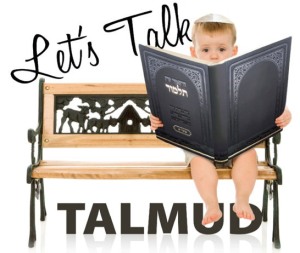 As I’ve mentioned already, Rabbinic commentary and authority to make binding halachah upon Jewish populations has always been at least uncomfortable if not downright offensive to Christians, and the Church has a long history of expressing that discomfort in rather dramatic and even violent ways. While we don’t burn volumes of Talmud anymore (hopefully), we do dismiss the Jewish right to view the Bible in a manner that upholds not only the continuation of the Jewish people, but of Judaism as a lived reality for all of Israel. Sadly, in doing so, we not only attempt to deny the Jewish people’s unique relationship with God but their very means of survival.
As I’ve mentioned already, Rabbinic commentary and authority to make binding halachah upon Jewish populations has always been at least uncomfortable if not downright offensive to Christians, and the Church has a long history of expressing that discomfort in rather dramatic and even violent ways. While we don’t burn volumes of Talmud anymore (hopefully), we do dismiss the Jewish right to view the Bible in a manner that upholds not only the continuation of the Jewish people, but of Judaism as a lived reality for all of Israel. Sadly, in doing so, we not only attempt to deny the Jewish people’s unique relationship with God but their very means of survival.
Interestingly, the penultimate mitzvah of the Torah is to assemble the nation of Israel once every seven years at the central sanctuary on Sukkot for a public reading of Deuteronomy. (Deuteronomy 31:19). That kernel would eventually germinate into our practice of weekly readings in the synagogue that cover the entire Torah in sequence in the course of a single year. Liturgy came to the aid of public instruction. Only an informed laity could make Judaism a lived reality. The advent of cantillation heightened the impact of the ritual, saving Hebrew from the fate of hieroglyphics.
Nothing is more important for the contemporary synagogue than to recapture the beauty and power of the Torah reading as a collective experience of revelation and an individual opportunity to internalize it.
-Ismar Schorsch
from “The Torah’s Final Mitzvah: To Internalize It,” pp. 630
Commentary on Nitzavim-Vayelekh
Canon Without Closure: Torah Commentaries
How the various Judaisms in our world conduct their affairs often appears confusing, conflicting, and baffling to those of us on the outside looking in. And as commentary in last year’s review of Torah Portion Pinchas attests, even two Jewish men in Messiah, both devoted to the mitzvot, have difficulty agreeing on what the authority of the Rabbis means, if anything at all, to modern Messianic Judaism. And yet it is the public reading of Torah in the synagogue on every Shabbat that recalls the commandment to publicly read Deuteronomy before all Israel on Sukkot as fulfillment of God’s desire that His Jewish people not only hear and obey, but internalize Torah as perhaps a foretaste of the days in which it will be written on the heart, truly internalized forever (and recall that Zechariah 14:16-19 predicts that representatives of the Gentile nations who attacked Israel and were defeated by her will also be obligated to observe Sukkot in Jerusalem, so we’ll be there, too).
In all their troubles, He was troubled, and an angel from before Him saved them; with His love with His compassion He redeemed them; He lifted them up and bore them all the days of the world.
–Isaiah 63:9 (Stone Edition Tanakh)
This is from last week’s Haftarah portion and is Isaiah’s commentary on how God will be with Israel and lift them up “all the days of the world,” which seems to mean as long as the Earth endures.
Let’s compare Isaiah to the following:
Do not imagine that I have come to violate the Torah or the words of the prophets. I have not come to violate but to fulfill. For, amen, I say to you, until heaven and earth pass away, not one yod or one thorn will pass away from the Torah until all has been established. Therefore the man who violates one of these small mitzvot and teaches sons of men to do like him will be called small in the kingdom of Heaven, but whoever does and teaches them will be called great in the kingdom of Heaven.
–Matthew 5:17-19 (DHE Gospels)
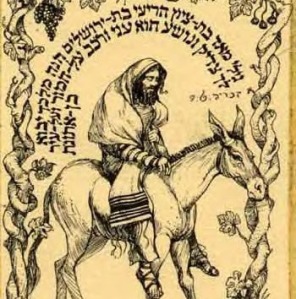 For all of those in Christianity who call for the end of Torah at the beginning of the risen Messiah, I still cannot comprehend how they get past the very words of the one in which we all place our hope. Jesus says pointblank that he has not come to abolish the Torah and that it will endure absolutely unchanged, just as it was given at Sinai, as long as the present Heaven and Earth remain. We know they remain until after the coming Messianic Age, and Heaven and Earth pass away only when we finally enter into eternity and the perpetual Gan Eden (Garden of Eden).
For all of those in Christianity who call for the end of Torah at the beginning of the risen Messiah, I still cannot comprehend how they get past the very words of the one in which we all place our hope. Jesus says pointblank that he has not come to abolish the Torah and that it will endure absolutely unchanged, just as it was given at Sinai, as long as the present Heaven and Earth remain. We know they remain until after the coming Messianic Age, and Heaven and Earth pass away only when we finally enter into eternity and the perpetual Gan Eden (Garden of Eden).
“Alas, you who lack knowledge and whose hearts are too heavy to believe all that the prophets have spoken! Did not the Mashiach have to bear all these things and be brought into his glory.”
Then he began with Mosheh and all of the Prophets and explained to them all of the Scriptures that spoke about him.
Then their eyes were opened and they recognized him, but he turned aside and passed from their eyes! They said to one another, “Were our hearts not burning within us as he spoke to us on the road and interpreted the Scriptures?”
–Luke 24:25-26, 31-32 (DHE Gospels)
I have longed to be one of the Master’s companions on that walk, to hear exactly what he said and to capture his precise explanation and proofs of the revelation of the identity of Messiah just as he spoke them. Alas, I will have to wait until the resurrection to comprehend through the Spirit all these things.
But as I was reading of this journey, I was struck by something he said, something I hadn’t noticed before.
Alas, you who lack knowledge and whose hearts are too heavy to believe all that the prophets have spoken!
Now compare the Master’s words to this:
Brethren, my heart’s desire and my prayer to God for them is for their salvation. For I testify about them that they have a zeal for God, but not in accordance with knowledge.
–Romans 10:1-2 (NASB)
Both the Master’s traveling companions and the Jewish people who are the object of Paul’s statement are accused of lacking knowledge. I think it is the same sort of knowledge being spoken of in both circumstances, knowledge of the revelation of Messiah from the Torah and the Prophets. In the former case, the Master provided that knowledge himself such that it caused the hearts of his listeners to “burn within them”. The latter group, Paul lamented over, that their zeal for God and the Torah erroneously resulted, through lack of that knowledge, in them mistakenly constructing a righteousness of their own bereft of faith, as if the mere doing of Torah without sincere love of God and man would be enough to justify anyone before the living God.
About Change
A person who lives with this attitude will not be thrown by difficult life situations. He views everything that happens to him in his life as a means of perfecting his character.
-Rabbi Zelig Pliskin
Commentary on Nitzavim, p. 453
Growth Through Torah
My studies which indeed reaffirm the Jewish covenant obligation to observe the mitzvot have not come without a cost. The cost was exacted by my own ego and presumptuous arrogance in publicly refuting the teachings of the Pastor I’ve spoken of before. I realize that as a United States citizen, the government cannot infringe upon my rights to free speech, nevertheless, I have a duty and responsibility to tame my tongue (and my fingers upon the keyboard) which I admit that I did not do, more to my shame.
About treating others with respect
Someone once came to the Chazon Ish’s house full of complaints and spoke to him with great insolence. Although that person spoke roughly, the Chazon Ish replied with complete serenity and extreme gentleness. In a very quiet manner he made a rebuttal to the person’s complaints. A Torah scholar who was standing nearby was greatly bothered by the disrespectful manner of the person. He was surprised, however, that when the person left the room, the Chazon Ish said to himself with pain and in a worried tone, “I am afraid that perhaps I didn’t speak to this person in a gentle enough manner.” (P’air Hador, vol.3, p.49)
The greater your awareness of our obligation to show respect to others, the more elevated will be your behavior.
-Rabbi Zelig Pliskin
Commentary on Nitzavim, p. 454
Growth Through Torah
 If I choose to adopt a fundamentally “Jewish” perspective on the Bible, including Jewish values and ethics, that should include a fundamental respect for all human beings. I admit, that’s not always easy for me to do, and the requirement to love other people (see Matthew 22:36-40) is sometimes drowned out by my “right” to express my opinion. But I cannot allow my so-called “rights” to overrule the directives and will of God. If I am a disciple and I call the Master “Lord,” then it is God who must come first, and I should be silent.
If I choose to adopt a fundamentally “Jewish” perspective on the Bible, including Jewish values and ethics, that should include a fundamental respect for all human beings. I admit, that’s not always easy for me to do, and the requirement to love other people (see Matthew 22:36-40) is sometimes drowned out by my “right” to express my opinion. But I cannot allow my so-called “rights” to overrule the directives and will of God. If I am a disciple and I call the Master “Lord,” then it is God who must come first, and I should be silent.
I’ll write more on this last point tomorrow, but in the meantime, you can read more about the specific issues of Torah as Paul understood them (and expressed them in his epistle to the Galatians) in last year’s commentary in the double-Torah Portion Nitzvaim-Vayelech.

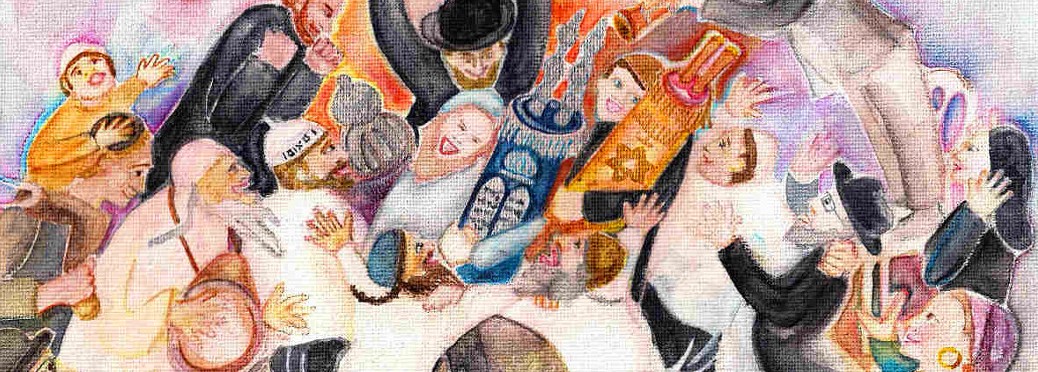
You should start writing books instead of blog post. You’d still be writing the same amount of words, but you’d be turning a profit instead. 😉
Since I am a published author (but not of religious books), I know it takes a little more than that, such as having a unified topic over many chapters and an established audience that the publisher knows will actually buy the book. 😉
Lol. I know. I was just giving you a hard time about your lengthy posts.
No worries. Someone on Facebook gave me heck for the length, too. Yeah, almost 3700 words. That’s a lot.
I don’t believe that expressing your own thoughts is either arrogance or presumption. In a real relationship, each party desires the input of the other. If one doesn’t speak up, agreement is assumed. To create an environment that discourages sharing so that the central figure can pretend unity, seems empty and hollow. Whether you or your pastor acted with misunderstanding or disrespect, I can’t say because I wasn’t there.
Speaking what you believe to be the Truth, and acting according to Torah Observance and in following in the footsteps of Mashiach automatically causes division.
Arguing points of doctrine even in perfect respect and humility causes people to speak what they believe, and it can happen that the auditor will take offense at the truth when it is proven, and pointed out.
It is incumbent upon all of us to keep the peace to the extent that it lies upon us. Truth, however, outweighs ruffling feathers and causing disagreements.
Yehoshua said He came not to bring peace, but a sword, and so it will be until His return, for we follow in His footsteps, and in attempting to point out the truth we can and will offend and cause division. What some forget is that it is supposed to be this way within Christianity and Messianic Judaism, for nowhere is Truth more valued.